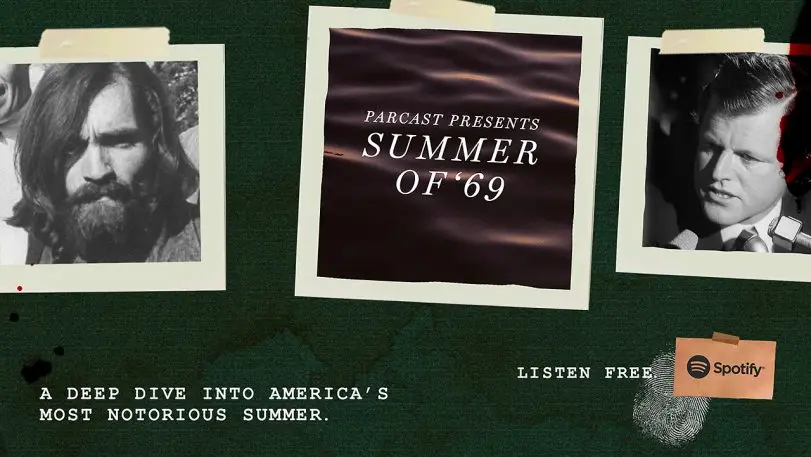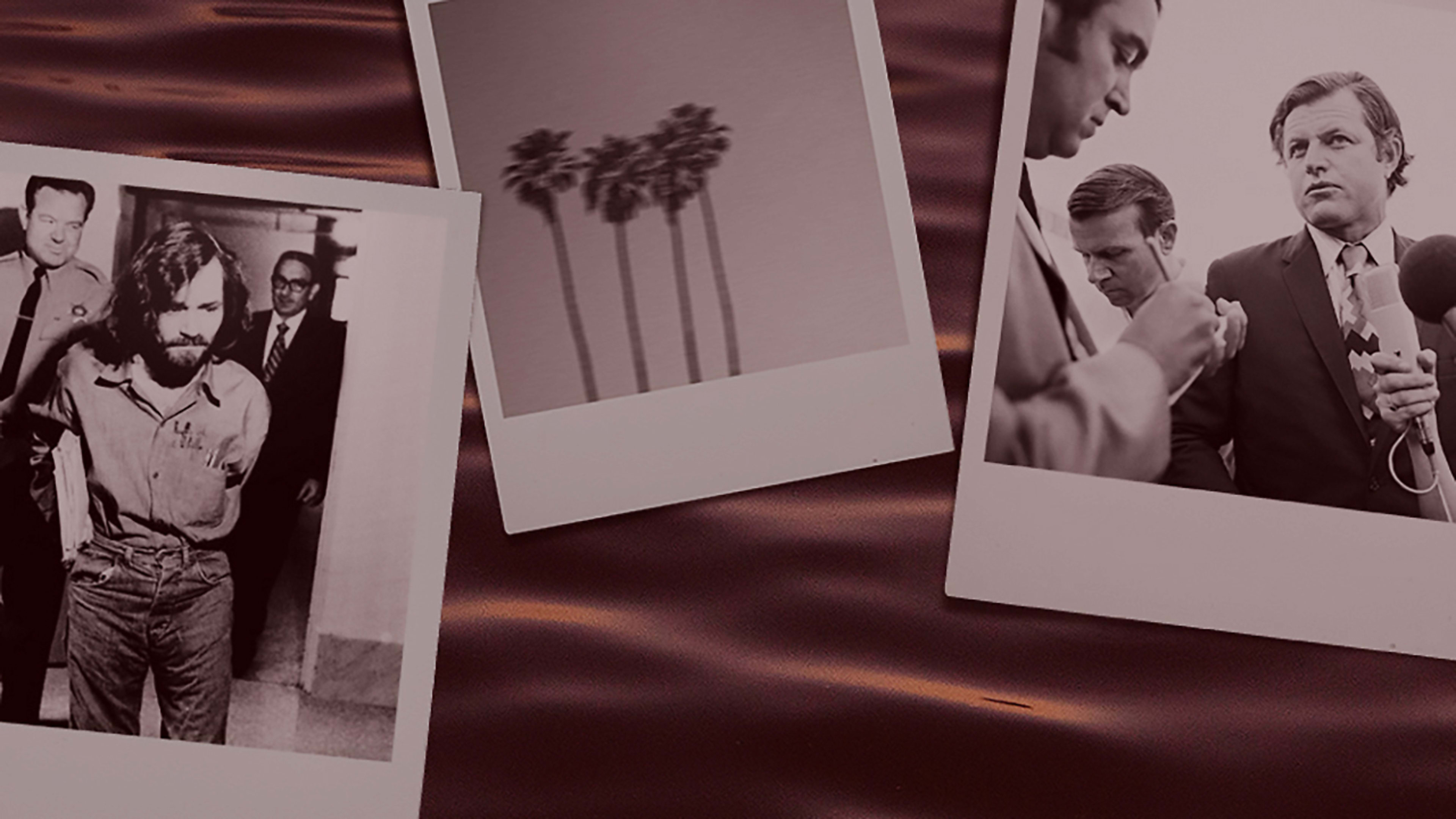Marvel may have memorably branded Avengers: Infinity War “the most ambitious crossover event in history,” but now that title has a challenger.
Well, at least in the podcast space.
From July 22 to August 9, the Parcast network, which Spotify acquired back in March, is rolling out its Summer of ’69 series, which splices DNA from over a dozen of its true crime and dark storytelling podcasts and organizes them all around a single theme: one of the weirdest, most consequential summers on record. The event is both Parcast’s opportunity to showcase why Spotify acquired it so soon after snapping up the more acclaimed podcast studio Gimlet Media, and it’s Spotify’s chance to show what it can do when it throws its marketing might behind a previously scrappy network.
Making a true crime podcaster
Parcast founder and president Max Cutler first took an interest in America’s rising fascination with true crime and serial killers around the time Making a Murderer premiered on Netflix in 2015. For the few weeks after the series dropped, it seemed to dominate office chatter nationwide. The question wasn’t ‘Have you seen Making a Murderer,’ but rather ‘Have you seen it yet?’ Clearly, the thirst for well-made true crime content was enormous.
“I think that true crime is kind of reality TV on steroids,” Cutler says. “You go to work nine-to-five every day and come home, and then you have serial killers who go to work, kill somebody, and come home, and a lot of people want to know: How does somebody live like that, that from a psychological standpoint? Sort of like when you think of, for example, the Kardashians. Most of us are stuck with normal working hours, and they’re living this amazing lifestyle. It’s just wanting to understand a real life that’s so far out of your own experience.”
As Cutler looked further into the phenomenon of true crime consumption, he became aware of a large crop of podcasts dealing with unsolved murders, serial killers, and other such mysteries—mostly fallout from Serial’s seismic impact the previous year. After actually listening to some of the more popular podcasts in that vein, though, he was surprised at what he heard.
There seemed to be two tiers for true crime shows. On one end of the spectrum, it was just two people talking in a garage, literally reading Wikipedia entries and somehow earning hundreds of thousands of downloads. On the other end were the shows that top networks like Gimlet were making, which often consisted of 12 TV adaptation-ready episodes with high-production values, and then a three-month absence. (The next season wasn’t just going to make itself, after all.)
In Cutler’s estimation, nobody at that point had figured out how to do a high-production show every week, in perpetuity. “I am a big believer in building listening habits,” Cutler says. And that’s just what he did in 2016, when he launched Parcast. Cutler hired screenwriters and researchers to create scripts for each episode, giving them a glossy feel on a comparatively low budget. The network specialized in simply titled shows like Serial Killers, Cults, and Conspiracy Theories, which came out each week like clockwork and quickly built up massive followings. In its first year, Parcast had five shows. By the end of 2018 it had more than tripled that amount, and the number has since ballooned to 22.

Building a cult-like audience
Although there are currently over 600,000 podcasts—another one will probably launch by the time you finish reading this sentence—Parcast’s content manages to stand out from the pack.
One of the keys to Parcast’s success is its cohesion as a brand. While a lot of podcast networks have shows that are loosely connected by either a sensibility or a level of quality, Parcast’s shows all feel of a piece. Rather than throwing every conceivable genre against the wall to see what sticks, Parcast is all in on shows about mysteries, murder, and betrayal—microspecific shades of color from the same dark and foreboding crayon box. This focus is partly responsible for how the network scaled without much of a marketing budget: Listeners of one show were bound to be interested in whatever weird madness was on display in its just-launched sister show.
Last year, Cutler found a new way to use his brand’s unity to connect with listeners: a crossover special. The hosts from Conspiracy Theories and Unexplained Mysteries teamed up to discuss the disappearance of Malaysian Airlines flight 370 in a two-part special. Other compatible shows tried out similar mashups as well. After the two-week event ended, Cutler found that the network had grown by 20%, a figure that ultimately sustained over time.
It’s not uncommon for a network to send the host of one of its shows to be a guest on another. This kind of cross-pollination is a proven tactic for exposing listeners to more of a network’s slate. The kind of scripted series that Parcast is known for, however, requires a lot more planning and work to execute this way. In order for Cutler and his team to try and top last year’s crossover event with a splashier special for 2019, they began planning in January.
As Cutler and his team traded ideas, it gradually dawned on the group that this year marks the 50th anniversary of 1969. Between the Vietnam War, the Manson murders, the Zodiac Killer, and the conspiracy around the Apollo mission, it was one uncommonly eventful year. As soon as Cutler saw the major headlines from the year that fit their dynamic, he reached out to the company’s researchers to ask whether there was actually enough content to get more than half of Parcast’s shows doing something related.
When they came back two weeks later with a list of 14 must-do episodes, he was shocked. Then he was excited.
The summer of Spotify’s podcasting ambitions
By tapping into the zeitgeist at the right moment, and staying lean while growing a respectable repertoire of shows, Parcast had caught Spotify’s attention. The streaming juggernaut had been aggressively branching out into podcasts for months, which then accelerated when the company acquired both Gimlet and Anchor in February. Parcast had been talking with Spotify as a potential sales partner, and the next thing Cutler knew, the company made a bid for acquiring the network, which it did on April 1.
“They believed in the vision I had in Parcast,” Cutler says of Spotify. “We’ve been growing at a crazy rate, and they really wanted to give me the resources to grow even quicker.”
Summer of ’69 will be the first major programming initiative Parcast has rolled out with Spotify’s marketing might behind it, and it seemed like a perfect expression of Parcast’s shows’ aligned interests. “There’s a lot of value in showing the full range of our offering,” Cutler says. “And since our concept is evergreen, that means that when someone finds a new podcast, they can go back and, in theory, binge on hundreds of hours of content.”
Bingeability in podcasts is a different beast than in, say, a Netflix series. While many TV shows are designed to keep viewers on the couch for as long as possible, podcasts are made to fit in while listeners go about the business of their lives. People generally don’t sit down and ingest podcasts for uninterrupted hours on end the way they might with Big Little Lies, at least not unless a long road trip is involved. So it’s been unclear what Spotify hoped to accomplish with the curated playlists the company has been experimenting with lately. Aside from coast-to-coast car trips and perhaps putting together a best-of list to help introduce a friend to some favorite shows, there simply hasn’t been much of a case for a playlist of podcasts.
Something like Summer of ’69, however, is a natural fit for the feature: Fourteen thematically linked, carefully assembled episodes of Parcast shows to devour one after the other. (Although hopefully not in one sitting.)
Summer of ’69 is as much a calling card for Parcast’s diverse offerings as it is a flex for Spotify as a podcast medium. It makes the two entities joining forces feel more like an innovation-driven partnership than a straight-up acquisition.
“One thing that’s exciting about Spotify is they’re testing a lot of technology, and, quite frankly, we need a huge technological revolution in the podcast space, because we’re still using a lot of technologies from the early 2000s,” Cutler says. “It’s really exciting to be at the forefront of testing out whatever features come next.”
Listen free to Parcast’s Summer of ’69 on Spotify. New episodes from now through August 9.
Recognize your brand’s excellence by applying to this year’s Brands That Matter Awards before the early-rate deadline, May 3.
